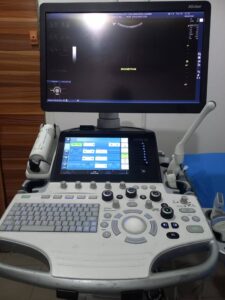Ultrasound

Ultrasound
Ultrasound involves exposing part of the body to high-frequency sound waves to produce pictures of the inside of the body. Ultrasound exams do not use ionizing radiation. Ultrasound imaging is a painless procedure that helps physicians diagnose and treat medical conditions.
A Doppler ultrasound study may be part of an ultrasound examination. Applications include abdomen and pelvis, OB/GYN, carotid, aorta, thyroid, renal, bladder, scrotum/testicles, veinous ultrasound, arterial ultrasound, and echo.
How do I prepare for the exam?
General instructions:
- For abdominal exam: no food or drink 4-6 hours prior to the exam. Medications may be taken with a small amount of water.
- For pelvis exam: require you to completely consume approximately 1 litre of clear, un-carbonated liquid(water) 60 minutes prior to the scan. Do not empty or relieve the bladder.
- Breast ultrasound: Patient may be required to bring all prior breast studies (i.e. mammogram films, breast ultrasound films, etc.).
- Renal ultrasound: fast for about 4-6 hours if possible.
- obstetrics scans: may require a full bladder if the fetus is younger than 18 weeks; completely consume approximately 0.5 liter of fluid 60 minutes prior to scan. Do not empty or relieve the bladder. Call prior to the exam if uncertain.
What should I expect during the exam?
Ultrasound imaging is a painless procedure. During the exam, a water-based gel is applied to the area to be examined.
What should I expect after the exam?
The examinations are interpreted by
certified radiologists. The results will be sent to the referring physician as soon as they are interpreted. The patient should contact the referring physician to discuss the results and ask for further recommendations.
